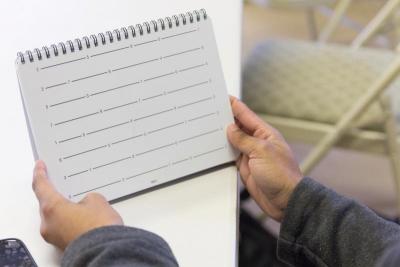Dartmouth Youth Soccer Association battles concussions head-on

No one is safe from concussions. Many people view concussions as events unique to high-contact sports like football. However, on Saturday, Oct. 24, a spectator at one of the Dartmouth Youth Soccer Association games took a hit to the head and had to be taken away in an ambulance. If a spectator could sustain an injury like that, what does this mean for athletes in the thick of all the action?
Awareness of the long-term damage concussions cause is on the rise. That’s why from 8 a.m.-2:30 p.m., Dr. Sherry Audycki partnered up with the Dartmouth Youth Soccer Association to establish concussion baselines with each individual player.
Audycki, her husband, Robert, and nursing volunteers from the UMass Dartmouth Student Nursing Association and medical assistant students from New Bedford Regional Vocational Technical High School administered the King-Devick Remove-From-Play Sideline Concussion Screening Test to soccer players in the youth soccer association.
The King-Devick Test is used to determine a baseline and can help evaluate if a person may be concussed. The test, initially used as a qualitative test as to how quickly children can read, consists of several lines of numbers. The numbers may be spaced out or have lines between them to help guide the reader’s eyes. The baseline is established by timing how quickly a person reads the numbers aloud.
After experiencing a mild concussive event, the brain cannot perform as well as usual. The cicadic back-and-forth movements of the eye is disrupted by the brain trauma, Audycki said. As a result, reading becomes much more difficult.
In the event that an athlete has sustained a blow to the head, if they are given the test and read at all slower than their baseline, they would be removed from play to prevent further injury.
Many people associate concussions with blunt, sudden head-on collisions, as is common in sports like football. However, serious head injuries can ensue from repeated sub-concussive events.
“The concern happens to be with the repetitive, sub-concussive event. That means there’s not one event,” said Audycki. “They’re not running and…hitting heads in one moment with another player... It’s the repetitive hitting-the-head at a high velocity, many times during the game. At the end of the day, after the game is done…the child might think ‘wow, I have a really bad headache.’…You don’t realize you had a concussion.”
This is a concern in soccer where head-butting the ball is very frequent. These sub-concussive hits can result in long-term damage and because there was no definitive moment where the athlete can recall having sustained a concussion, the damage can run under still waters for many years.
These concussion baselines are not mandatory for players in the association. Those who were tested chose to be tested voluntarily. The King-Devick Test has grown in popularity in college athletics as a sideline concussive screening test.
Over the course of two days, Audycki tested about 250 kids, falling short of her goal of 600 kids. There are about 800 athletes in the Dartmouth Youth Soccer Association. However, coaches were very enthusiastic about having more information about how to keep their athletes healthy.
“Every coach wants to know. Every coach wants more information, to help them keep all these kids safe and healthy,” Audycki said.
Because there is no universal standard since each person reads at a different pace, every individual must be tested for their own personal baseline. If, when tested again after a collision, the individual reads even a little slower than their baseline, the player should be removed from play.
Audycki hopes to become more involved with the spring athletes who are more competitive and aggressive when on the field.
“The coach wants to make [baseline testing] mandatory for his elite travel kids,” Audycki said.
Though there aren’t a set number of screenings, Audycki will continue to administer them into November. After that time, she will collate her information and send it to King-Devick to help them try and determine a universal baseline.
The King-Devick concussion screening test is available for purchase for $20 and there is an app available for $15.


















